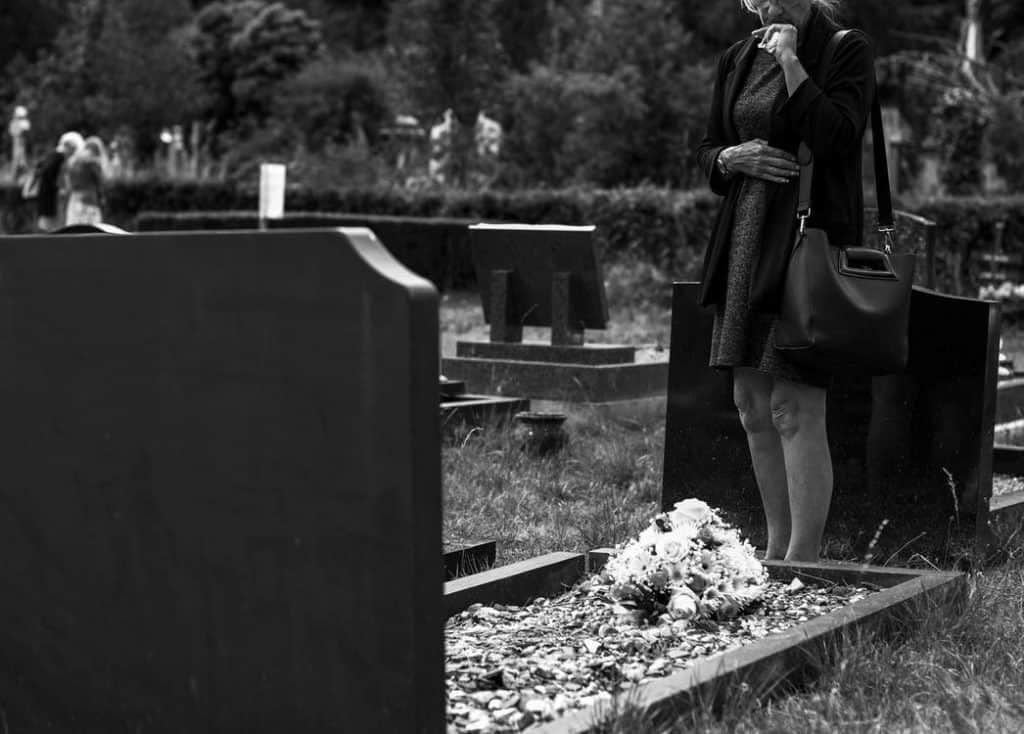The horrible irony of loss is that at a time when you want to shut down and ignore the world, you must organise so much. The loss of a loved one can be emotionally overwhelming, but there are legal steps that must be taken, and you must somehow summon the strength to undertake these obligations.
This guide aims to make clear you should do in the event of a death. We hope that this explanation of all that needs to be done will help you through this difficult time.
Expected deaths in the home
If the end is expected, for instance, if the person has a terminal illness, then you should call the family doctor and their nearest relative. As the death was expected by the authorities, as well as you, there is little delay in the issuing of a medical certificate, which will allow you to register the death. The GP should be able to do this for you as soon as you are ready to discuss the passing of the loved one. This certificate will then allow you to contact a funeral director and begin the necessary arrangements.
Unexpected deaths in the home
If the death is unexpected, the event is treated in a way dependent on the circumstance. Therefore, you are best to call 111. An advisor will talk you through all you have to do. It may be that this death will need to be reported to a coroner to be investigated. This coroner may request a post-mortem and may open an inquest. As this could take some time, the arrangements for a funeral may be delayed.
Deaths in Hospital
The hospital will be well versed in what needs to happen in the event of a death. The support you will receive should help you deal with the immediate aftermath of the loss. The hospital will issue the medical certificate and the formal notice. They will also keep the body in the hospital mortuary until a funeral director or another individual organises the transfer to a chapel of rest or to the family home.
Register a death
It is important to register the death within five days in England and Wales and within eight days in Scotland. Failure to register the death in time can lead to a £200 fine. The deadline can be delayed by a further nine days if the registrar is aware that a medical certificate has been issued. It may be that the death is reported to a coroner; in this case, you will not be able to register the death formally until the coroner has completed the investigation.
The process of registering a death is straightforward. Here are the steps you should take:
Step 1: Locate your nearest register office. This is where you would declare births, deaths and marriages and is likely to be connected to council offices. Call the office and request an appointment to register the death. Do this as soon as you can, as the office can become busy.
Step 2: Select the person to register the death. Usually, the person to register the death is a close relative. If there is no relative, then there are only a limited number of other options. Only a person who was present at the death or lives in the same house as the deceased, or the person arranging the funeral who is not a funeral director can register the death.
Step 3: Collect together the necessary paperwork. You will need a lot of documentation to register the death successfully. Most importantly, you will need the medical certificate of cause of death, which will be signed by a doctor. You will also need the birth certificate, council tax bill, driving licence, passport, marriage or civil partnership certificate, an NHS medical card and proof of address. If some of this paperwork is not available, then it likely that the registering of death can still go ahead. The only document you must have is the medical certificate from the doctor.
Step 4: Attend the appointment. You will be expected to provide all relevant information to the registrar to enable them to register the death. This will take about 30 minutes. You will need the full names of the person, their full home address, date and place of birth, details of when and when the person died, their occupation, and whether they were receiving benefits. You will also need to provide the name, occupation and date of birth of a spouse or their civil partner, if applicable.
Once you have registered the death, you will receive a Certificate of Registration of Death. There will also be some other relevant documents that will be essential for the next steps. You will receive a green certificate for the burial or cremation. You can also request a Death Certificate for a small fee. You will need this Death Certificate for many of the legal and financial arrangements to come. This is the official notification of the death issued by the registrar and declares that the death has occurred.
How to arrange a funeral
It may be that the person who has died has left instructions in a letter or will for how the funeral should be arranged. If this is the case, you can pass these to a funeral director who can enact these wishes. However, if there is no such direction from the deceased, then the executor or nearest relative will decide if the body is to be cremated or buried and the other details of a funeral.
The steps for arranging a funeral are not as difficult as you may fear.
Step 1: Find a funeral director. The National Association of Funeral Directors and the National Society of Allied and Independent Funeral Directors lists all the funeral directors, and you should be able to find organisations in your area.
Step 2: Get more than one quotation. As distressing as this might sound, you should seek out more than one quote for funeral services. As with any business, there are different levels of service, and some are more expensive than others. Make sure this quote is itemised and includes: the services of the funeral director; the cost of the coffin; the transfer of your loved one from the place of death to the Chapel of Rest and then to the funeral; the cost of the hearse and all the necessary arrangements and paperwork. You will need to ask about other expenses, such as the crematorium, the clergy or pastor, the doctors and others. It is likely the funeral director will request these additional fees up front.
Step 3: Talking through the options. You will then need to consider all the different options for the funeral. This can be distressing, but most people report that this is an essential process for coming to terms with death. You will need to think about the type of service, the music, who will speak and what will happen after the funeral. You may wish to invite people to celebrate the life of the person at a wake or similar event.
Step 4: Paying for the funeral. It is an unfortunate truth that a funeral is expensive. It can be paid for by family members and friends. However, other options may be available. There could be a lump sum payout from a life insurance policy or a pension scheme. It could be that the individual took out a pre-paid funeral plan or that there is enough money in the person’s estate to cover the costs. The cost of the funeral is taken first before any other debt. You may be able to release money from the deceased’s bank account. However, money from the person’s estate may be delayed while in probate. If the person dies intestate, this could delay the processing of the estate significantly.
You can get help with funeral costs from the Social Fund if you are on a low income. There are strict rules on who can receive this help and how much they can receive. If you don’t qualify for a payment from the Social Fund, you may still be able to get an interest-free loan for up to £1500.
Who do you need to tell about a death?
Informing people of the death of a loved one can be raw and painful. However, there are certain people you should tell and people you must tell.
You must tell government organisations. The government has a Tell Us Once service. This service will allow you to notify organisations of a person’s death all at the same time. Although this service is not available in all areas of the UK, where it is available it can help you inform HMRC, DWP, the passport office, the DVLA, the local council and, if applicable, Veterans UK.
You will also need to inform: the pension scheme provider, the insurance company, the bank and building society, an employer or school, the mortgage provider, housing association, council offices, the social services, all the utility companies, any medical services including the GP, dentist and optician. It is a good idea to instruct a solicitor to act your behalf too.
You can also register the death with the Bereavement Register. This will remove the name of your loved one from mailing lists and should prevent receipt of upsetting reminders in the future.
You should also seek to inform relatives, friends, employers, and schools – or anyone who has a personal stake in the life of the individual. This can be difficult, and you may wish to enlist the support of someone close to help you with this process.
Death Certificates
When informing organisations of the death of a loved one, they are likely to request a copy of the death certificate. You will have been given the option to purchase a death certificate from the registrar upon the registering of the death. It is an essential document for those who are managing the estate of the deceased. It is a good idea to request many copies of this death certificate. Each certified copy will cost £11 in England and Wales.
If you did not get multiple copies of the death certificate when registering the death, you will need to apply to get a copy. You can do this by contacting the General Register Office in England and Wales. The insurance companies and the banks are unlikely to accept photocopies of a death certificate.
The same people who registered the death, e.g. relatives or a person with the deceased at the time of death, can collect the death certificate.
Bereavement Support Services
There are practical arrangements in the event of a death, and then there are the pressing emotional challenges to face. Grief is challenging for everyone. It is not something that is easily managed alone or without the support of professionals. Therefore, it is a good idea to reach out to Bereavement Support Services. Here we introduce some of the possible services you could approach.
Cruse Bereavement Care: Cruse is a national charity that aims to help people through the process of grief. They can offer face-to-face sessions, group conversations, telephone calls, email and website support.
The Coroners Courts Support Service: If the death is unexpected and there is an inquest or investigation into the death, then loved ones can seek support from the Coroner’s Court. This group can offer both emotional and practical support in the lead up to an inquest.
Child Bereavement UK: Is there anything more complicated than the loss of a child? This service offers help to the loved ones of a child. However, they also provide support to children who suffer grief too. The Child Death Helpline is also available and is staffed by trained bereaved parent volunteers.
Grief Encounter helps those who are suffering from the emotional consequences of death. They can offer conversation and information, as well as access to professional support.
There are also specific support organisations who serve particular circumstances. If there has been a suicide, or the death as a result of a terminal illness, or sudden infant death – then specific charities will provide support groups and advice.
In summary
The period after death is traumatic. Many people who have dealt with death will tell you that the practical arrangements required are challenging but in some ways a blessing. The feelings of helplessness and loss of control can contribute to the pain of missing someone. Therefore, by organising paperwork and funerals, there is something to be done, no matter how sad.
What is essential to remember above all else is that you should not seek to do this all by yourself. Grief, if ignored, can create problems in the future. Remember to reach out and allow the feelings to come and go. Negative emotions may not quickly pass, but at some point, you will be able to remember and smile again.
Extended reading resource:-






